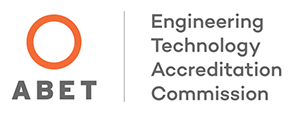Program Accreditation – Construction Engineering Technology
Bachelor of Science (B.S.) Degree in Construction Engineering Technology
The Construction Engineering Technology program is accredited by the Engineering Technology Accreditation Commission (ETAC) of ABET, under the commission’s General Criteria and Program Criteria for Construction Engineering Technology. This program leads to a Bachelor of Science degree in Construction Engineering Technology.
Program Data
Program Accreditation – Electrical Engineering Technology
Bachelor of Science (B.S.) Degree in Electrical Engineering Technology
The Electrical Engineering Technology program is accredited by the Engineering Technology Accreditation Commission (ETAC) of ABET, under the commission’s General Criteria and Program Criteria for Electrical Engineering Technology. This program leads to a Bachelor of Science degree in Electrical Engineering Technology.
Program Data
Program Accreditation – Mechanical Engineering Technology
Bachelor of Science (B.S.) Degree in Mechanical Engineering Technology
The Mechanical Engineering Technology program is accredited by the Engineering Technology Accreditation Commission (ETAC) of ABET, under the commission’s General Criteria and Program Criteria for Mechanical Engineering Technology. This program leads to a Bachelor of Science degree in Mechanical Engineering Technology.
Program Data
Program Accreditation – Surveying Engineering Technology
Bachelor of Science (B.S.) Degree in Surveying Engineering Technology
The Surveying Engineering Technology program is accredited by the Engineering Technology Accreditation Commission (ETAC) of ABET, under the commission’s General Criteria and Program Criteria for Surveying Engineering Technology. This program leads to a Bachelor of Science degree in Surveying Engineering Technology.
Program Data

